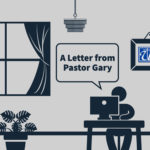
It seems almost, if not, daily we engage in some conversation that includes saying, “Before the pandemic” and/or “After the pandemic.” Maybe we should begin dating things BP and AP. A few years after, that is AP, the impact of the pandemic remains, like the force with Luke Skywalker, strong. People and institutions large and small operate differently since the pandemic.
I can’t help wonder, however, if the pandemic was something that exposed us more than it did change us? Absolutely things were different during the pandemic. And, as previously stated, much has changed after the pandemic.
Think, however, of the time of the pandemic as well as its after affects. During the pandemic divisions in our country seemed to widen instead of coming together. After the pandemic, we seem, if anything, more divided. So often difficult times have a way of bringing people together; the attack on Pearl Harbor, the Kennedy assassination, the terrorist attacks on 9-11. One would have been on solid ground to think the insurrection of January 6 would bring us together. And it did, but only for about a day, then everyone dug into their side even more deeply and the divide widened. We couldn’t even agree killing police, threatening top governmental officials with death, and trying to overthrow the will of the people was wrong.
The pandemic exposed that anything and everything could be co-opted for political gain. In his Large Catechism regarding the commandment against stealing, Martin Luther said we have an obligation to care for our neighbor. Should we fail to do so, according to Luther, would be to steal from our neighbor. It seemed we saw more verbal and even violent attack on the neighbor than we did see care. Masks were made about the wearer, not about the neighbor. Much health advice and those working diligently to provide it was scorned.
We have become a culture of “us vs. them” and we stick mostly to our own tribe where our thoughts are mostly reinforced. We don’t even wish to know why someone thinks differently than do we. What life-shaping forces made them think as we do? We prefer judging to conversation, listening, and asking.
Scratch the surface of much of the divide and the issue of race oozes out. We all have our platitudes regarding race and racism. Do we ever have conversations with those of different races to ask what their life experience is now and what it has been in the past? I am reminded of a cartoon in the ‘60’s that showed a crowd of white people gathered pointing at a gathering of 3 African Americans with the white folks saying, “Look at how they stick together”, totally oblivious to the fact their small multitude was doing the exact same thing.
Advent nears. That means Jesus nears. Many are quite good about making New Year’s resolutions. Might we make an Advent resolution to seek out in dialog those on the other side of our culture’s widening fissure? Might we so prepare for Jesus that we make serious attempts to have him find us as caring for all our neighbors as we see demonstrated in Jesus’ parable of the Good Samaritan? Can we see even the enemy as our neighbor as the Samaritans were the hated villains of Jesus’ teaching audience?
What might we do beyond pointing fingers and making accusations?
Yes, some of our behavior has changed due to the pandemic. Our call to love the neighbor has changed. There are no asterisks or footnotes to Jesus’ teachings and parables saying “not applicable in difficult times.” Indeed, these are very much for difficult times.
The pandemic has exposed the tenuousness and vulnerability of life. It may have amped up our anxiety level, but we cannot hide behind this and blame our woes on it. What are we going to do about our divisions? What we have been doing is failing. What was exposed in ourselves that needs addressing and change? How might we have been hiding behind the pandemic and using it as an excuse for the way things are and maybe even preventing us from working to change the status quo?
We are always who we have been…BP and AP; God’s imperfect sinners. GOD’S imperfect sinners. Belonging still to God, might we work to belong with each other?
